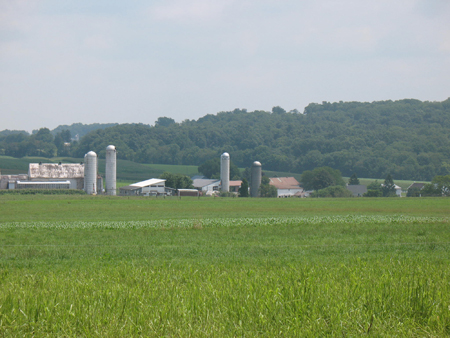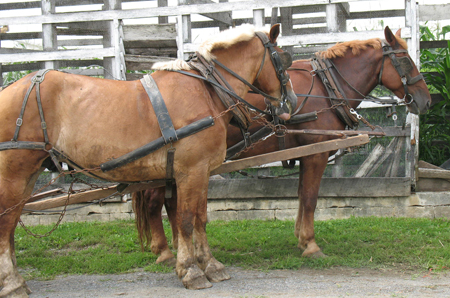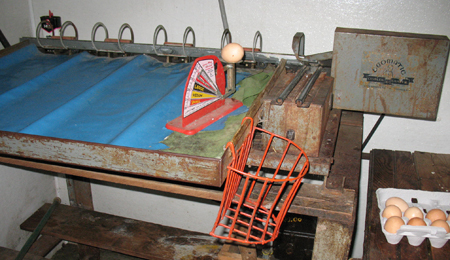The summer crops have finally enjoyed a couple of days of summer heat (and we have all been complaining about the oppressive humidity!)
The eggplants are especially beautiful this year. You will notice that we have a wide variety of shapes, sizes and colors. The same cooking styles can be used for the different eggplant, as their taste and texture seem to be similar. They are especially delicious when brushed with olive oil and sea salt and placed on the grill! You could also add zucchini, peppers and onions.
Changing your Pick up Day: Please remember to notify us if you need to change your pick up day. You may do this either through the online ordering system, or by calling, emailing or writing a note on the pick-up list. We try to harvest the crops to provide for the exact number of shares expected each day. If you show up on a day when you are not scheduled, you will be taking someone else’s food. We apologize to those who did not receive lettuce on Monday - we noticed that at least 4 people came unexpectedly.
SCHEDULE OF CLASSES/ WORKSHOPS:Listed below are the remaining classes and workshops scheduled throughout the month:
Please note that the Seedlings Cooking Classes are $10 per child.
Friday August 14th 3-4 pm- Seedlings Cooking Class for 9 through 11 year olds:Cold Zucchini or Cucumber SoupGrilled Vegetable SandwichesBlackberry SmoothiesMonday August 17th- 4-5 pm- Seedlings Cooking Class for 12-18 year olds:Italian Eggplant Spread (Caponata)Green BundlesGarden Salad with Herb DressingSunday, August 23rd- Preserving the Harvest : Canning Workshop with Liz Alakszay2-4 pm $20 per person
This is the first workshop in a series given by Liz, an avid vegetable and small fruit grower in Chester County. This workshop will answer questions related to canning such as:
Why and how do you can?How does canning preserve the food?How do you store canned items and ensure that they are safe?Various processing methods and equipment will be discussed and displayed. The participants will work along with the instructor to use the boiling water canning method to apply these concepts create their own canned vegetables. The specific vegetables will be determined based on availability.
FOOD INC. - This pivotal movie about the industrialized food system opens Friday August 14th at the Colonial Theater in Phoenixville. The Maysie’s Crew is planning on going to opening night- please join us! The movie starts at 7 pm. Also, on Wednesday evening, August 19th, there will be a discussion led by Liz Anderson of Charlestown Cooperative Farm and Dan Heckler of Jack’s Farm after the showing. Below is an excerpt taken from the film’s website:
“Our nation’s food supply is now controlled by a handful of corporations that often put profit ahead of consumer health, the livelihood of the American farmer, the safety of workers and our environment.”
One of the recipes this week comes from CSA Member Kelly Pipich, who says that this soup is delicious - and it uses everything you can get this week- including the purslane!!
Chilled Zucchini Soup with Purslane2 tablespoons extra-virgin olive oil, plus more for drizzling
1 small onion, thinly sliced
2 garlic cloves, thinly sliced
1 teaspoon thyme leaves
1 bay leaf
8 small zucchini (3 pounds), thinly sliced, plus long zucchini shavings for garnish
Kosher salt
3 cups water
2 tablespoons finely shredded basil
2 cups ice
Freshly ground pepper
2 cups purslane or baby arugula
In a large saucepan, heat the 2 tablespoons of olive oil. Add the onion and garlic and cook over moderate heat until translucent, about 8 minutes. Stir in the thyme and bay leaf and cook until fragrant, about 1 minute. Add the sliced zucchini, season with salt and cook, stirring occasionally, until tender, about 10 minutes. Add the water and bring to a boil. Remove the saucepan from the heat. Discard the bay leaf and stir in the shredded basil.
Working in batches, puree the soup in a blender until very smooth. Transfer the zucchini puree to a large bowl. Stir in the ice. Refrigerate the zucchini soup for at least 3 hours, until thoroughly chilled.
Season the soup with salt and pepper. Ladle into shallow bowls and top with a small handful of purslane and zucchini shavings. Drizzle with olive oil and serve.
And, to use up those eggplants, here is a recipe from a website:
www.aubergines.orgEggplant Catalana
4 large eggplants
1 medium size onion
garlic to taste
1 cup oil
1 pound fresh tomatoes
6 walnuts
fresh parsley
salt
1 cup stock
Cut the eggplant in slices crosswise, with their skin, sprinkle with salt and let rest 10 minutes. Drain, dry and fry in hot oil. Put aside.
In an earthenware pot with a little oil, fry the peeled and minced garlic, with the peeled and minced onion. When done, add the peeled tomatoes cut in small pieces, and when cooked, add the eggplant.
Salt and pepper to taste, and then add the walnuts, processed coarsely in a food processor and stirred in the cup of stock.
Cook at very low heat until not too liquid. It is served in the earthenware pot in which it was cooked, and can be served with a fried egg per person if desired.
See you around the farm!
Annmarie and Sam
Think Globally, Eat Locally
Maysie's Farm Conservation Center
15 St. Andrew's Lane Glenmoore, PA 19343
(610)458-8129 www.maysiesfarm.org











